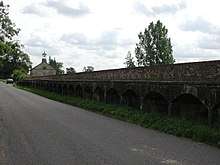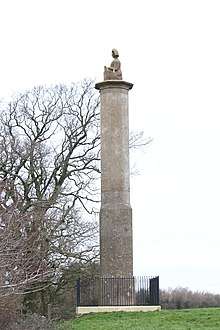Maud Heath's Causeway
Maud Heath's Causeway is a pathway dating from the 15th century in rural Wiltshire, England. On both sides of its crossing of the River Avon, just west of Kellaways, the path rises above the floodplain on sixty-four brick arches (built 1812, largely reconstructed in the 20th century)[1] alongside an undistinguished country road between Bremhill and Langley Burrell.

The causeway is the gift of the eponymous Maud Heath, who made her living carrying eggs to market at Chippenham. She was a widow and childless, and when she died she left money to improve and maintain the path along which she had tramped to market several times a week for most of her life. Five hundred and some years later, the charity still maintains the path out of her bequest.
Near the east bank of the Avon at grid reference ST 9469 7580 a three-metre high carved stone pillar with sundials, dated 1698, is inscribed "To the memory of the worthy Maud Heath of Langly Burrell Widow who in the year of Grace 1474 for the good of travellers did in Charity bestow in Lands and houses about Eight pounds a year for ever to be laid out on the Highways and Causey leading from Wick Hill to Chippenham Clift".[2]

A roadside marker stone near the eastern terminus at Wick Hill near Bremhill, at ST 9730 7386 about 2.1 miles (3.4 km) southeast of the Avon crossing, carries an iron plate inscribed "From this Wick-Hill/begins the praise/Of Maud Heath's gift/To these highways".[3] Further up the hill stands Maud Heath's Monument, a statue of the eponymous lady, erected on a high column in 1838 and looking out over the Chippenham mud flats. The statue, in a bonnet and authentic plebeian clothes from the reign of Edward IV, was erected by Lord Lansdowne, and features a poem by the critic William Lisle Bowles, who was vicar of Bremhill at the time, which reads:
'Thou who dost pause on this aerial height/ Where Maud Heath's Pathway winds in shade and light/ Christian wayfarer in a world of strife/ Be still and consider the Path of Life.'[4]
Since 1960 the raised section has been listed Grade II* on the National Heritage List for England, and the sundial monument and high column are listed Grade II.
A brief guide to the causeway was written by K.R. Clew in 1982.[4]
References
- Historic England. "Maud Heath's Causeway (raised section) (1022351)". National Heritage List for England. Retrieved 20 January 2019.
- Historic England. "Maud Heath's Monument (1022352)". National Heritage List for England. Retrieved 20 January 2019.
- Historic England. "Marker stone opposite Monument Farm (1363767)". National Heritage List for England. Retrieved 20 January 2019.
- Historic England. "Maud Heath's Monument (1283362)". National Heritage List for England. Retrieved 13 November 2017.
External links
- "Maud Heath". Chippenham Museum. Archived from the original on 2 February 2014.
- Walk: Bremhill and Maud Heath's Causeway – The AA
